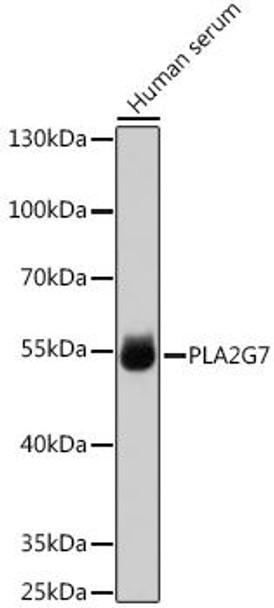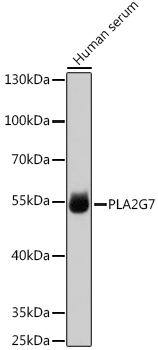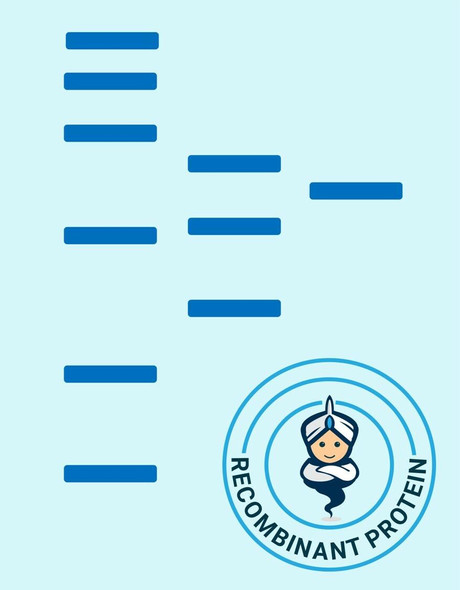Anti-PLA2G7 Antibody (CAB13864)
- SKU:
- CAB13864
- Product type:
- Antibody
- Reactivity:
- Human
- Mouse
- Rat
- Host Species:
- Rabbit
- Isotype:
- IgG
- Antibody Type:
- Polyclonal Antibody
- Research Area:
- Metabolism
Frequently bought together:
Description
| Antibody Name: | Anti-PLA2G7 Antibody |
| Antibody SKU: | CAB13864 |
| Antibody Size: | 20uL, 50uL, 100uL |
| Application: | WB IF |
| Reactivity: | Human, Mouse, Rat |
| Host Species: | Rabbit |
| Immunogen: | Recombinant fusion protein containing a sequence corresponding to amino acids 51-240 of human PLA2G7 (NP_005075.3). |
| Application: | WB IF |
| Recommended Dilution: | WB 1:500 - 1:2000 IF 1:50 - 1:100 |
| Reactivity: | Human, Mouse, Rat |
| Positive Samples: | Human serum |
| Immunogen: | Recombinant fusion protein containing a sequence corresponding to amino acids 51-240 of human PLA2G7 (NP_005075.3). |
| Purification Method: | Affinity purification |
| Storage Buffer: | Store at -20°C. Avoid freeze / thaw cycles. Buffer: PBS with 0.02% sodium azide, 50% glycerol, pH7.3. |
| Isotype: | IgG |
| Sequence: | FGQT KIPR GNGP YSVG CTDL MFDH TNKG TFLR LYYP SQDN DRLD TLWI PNKE YFWG LSKF LGTH WLMG NILR LLFG SMTT PANW NSPL RPGE KYPL VVFS HGLG AFRT LYSA IGID LASH GFIV AAVE HRDR SASA TYYF KDQS AAEI GDKS WLYL RTLK QEEE THIR NEQV RQRA KECS QALS LILD ID |
| Gene ID: | 7941 |
| Uniprot: | Q13093 |
| Cellular Location: | Secreted, extracellular space |
| Calculated MW: | 50kDa |
| Observed MW: | 55kDa |
| Synonyms: | PLA2G7, LDL-PLA2, LP-PLA2, PAFAD, PAFAH |
| Background: | The protein encoded by this gene is a secreted enzyme that catalyzes the degradation of platelet-activating factor to biologically inactive products. Defects in this gene are a cause of platelet-activating factor acetylhydrolase deficiency. Two transcript variants encoding the same protein have been found for this gene. |
| UniProt Protein Function: | PLA2G7: Modulates the action of platelet-activating factor (PAF) by hydrolyzing the sn-2 ester bond to yield the biologically inactive lyso-PAF. Has a specificity for substrates with a short residue at the sn-2 position. It is inactive against long-chain phospholipids. Defects in PLA2G7 are the cause of platelet-activating factor acetylhydrolase deficiency (PAFAD). An enzymatic deficiency that results in exacerbated bodily response to inflammatory agents. Asthmatic individuals affected by this condition may manifest severe respiratory symptoms. Defects in PLA2G7 are a cause of susceptibility to asthma (ASTHMA). The most common chronic disease affecting children and young adults. It is a complex genetic disorder with a heterogeneous phenotype, largely attributed to the interactions among many genes and between these genes and the environment. It is characterized by recurrent attacks of paroxysmal dyspnea, with weezing due to spasmodic contraction of the bronchi. PLA2G7 variants can be a risk factor for the development of asthma and PLA2G7 may act as a modifier gene that modulates the severity of this disease. Defects in PLA2G7 are a cause of susceptibility to atopic hypersensitivity (ATOPY). A condition characterized by predisposition to develop hypersensitivity reactions. Atopic individuals can develop eczema, allergic rhinitis and allergic asthma. Belongs to the AB hydrolase superfamily. Lipase family. |
| UniProt Protein Details: | Protein type:Secreted, signal peptide; EC 3.1.1.47; Secreted; Hydrolase; Lipid Metabolism - ether lipid Chromosomal Location of Human Ortholog: 6p21.2-p12 Cellular Component: cytoplasm; extracellular region Molecular Function:calcium-independent phospholipase A2 activity; phospholipid binding; 1-alkyl-2-acetylglycerophosphocholine esterase activity Biological Process: cellular protein metabolic process; lipid catabolic process; positive regulation of inflammatory response Disease: Asthma, Susceptibility To; Ige Responsiveness, Atopic; Platelet-activating Factor Acetylhydrolase Deficiency |
| NCBI Summary: | The protein encoded by this gene is a secreted enzyme that catalyzes the degradation of platelet-activating factor to biologically inactive products. Defects in this gene are a cause of platelet-activating factor acetylhydrolase deficiency. Two transcript variants encoding the same protein have been found for this gene.[provided by RefSeq, Dec 2009] |
| UniProt Code: | Q13093 |
| NCBI GenInfo Identifier: | 2497687 |
| NCBI Gene ID: | 7941 |
| NCBI Accession: | Q13093.1 |
| UniProt Secondary Accession: | Q13093,Q15692, Q5VTT1, Q8IVA2, A5HTT5, |
| UniProt Related Accession: | Q13093 |
| Molecular Weight: | |
| NCBI Full Name: | Platelet-activating factor acetylhydrolase |
| NCBI Synonym Full Names: | phospholipase A2, group VII (platelet-activating factor acetylhydrolase, plasma) |
| NCBI Official Symbol: | PLA2G7 |
| NCBI Official Synonym Symbols: | PAFAD; PAFAH; LP-PLA2; LDL-PLA2 |
| NCBI Protein Information: | platelet-activating factor acetylhydrolase; LDL-PLA(2); gVIIA-PLA2; PAF 2-acylhydrolase; PAF acetylhydrolase; group-VIIA phospholipase A2; LDL-associated phospholipase A2; lipoprotein-associated phospholipase A2; 1-alkyl-2-acetylglycerophosphocholine esterase; 2-acetyl-1-alkylglycerophosphocholine esterase |
| UniProt Protein Name: | Platelet-activating factor acetylhydrolase |
| UniProt Synonym Protein Names: | 1-alkyl-2-acetylglycerophosphocholine esterase; 2-acetyl-1-alkylglycerophosphocholine esterase; Group-VIIA phospholipase A2; gVIIA-PLA2; LDL-associated phospholipase A2; LDL-PLA(2); PAF 2-acylhydrolase |
| UniProt Gene Name: | PLA2G7 |
| UniProt Entry Name: | PAFA_HUMAN |








